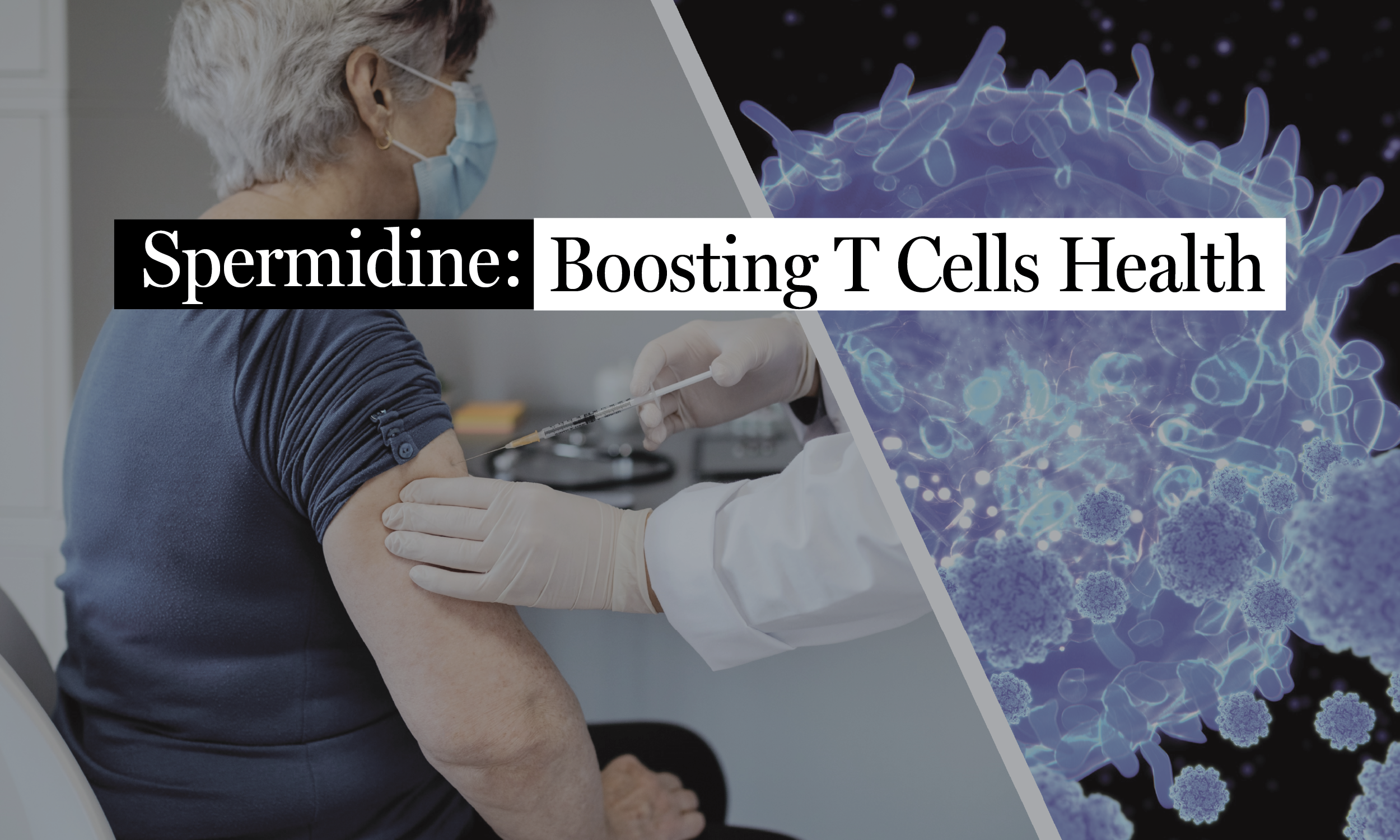
The immune system is a marvel of biological engineering, protecting us from infections and diseases throughout our lives. Among its key players are T cells, which are essential for adaptive immunity, memory formation, and vaccine responses. However, as we age, T cell function declines, leading to weakened immune responses, a phenomenon known as immunosenescence. Spermidine, a naturally occurring polyamine, has emerged as a promising compound to counteract this decline by enhancing autophagy, a cellular process critical for T cell health. This blog explores the mechanisms and benefits of spermidine in supporting T cells for lifelong immune health.
What Are T Cells?
T cells, or T lymphocytes, are white blood cells central to the adaptive immune system, which “learns” to recognize and respond to specific pathogens. They develop from stem cells in the bone marrow and mature in the thymus (hence the “T”). T cells identify infected or abnormal cells and coordinate immune responses. Key types include:
- Helper T cells (CD4⁺) activate other immune cells and orchestrate the immune response.
- Cytotoxic T cells (CD8⁺) directly destroy infected or cancerous cells.
- Regulatory T cells (Tregs) help maintain immune balance and prevent overactivation or autoimmunity.
With age, T cells lose their effectiveness, a phenomenon known as immunosenescence, which contributes to higher infection rates, poorer vaccine responses, and slower recovery in older adults. Supporting T cell health is therefore critical for maintaining strong immunity throughout life.
Autophagy: The Foundation of T Cell Health
Autophagy is a cellular process that involves the degradation and recycling of damaged organelles and proteins. It is essential for maintaining cellular health and function, particularly in long-lived cells like memory T cells. Memory CD8+ T cells are crucial for long-term immunity, as they "remember" past infections and enable the immune system to respond more rapidly and effectively upon re-exposure to the same pathogen.
Studies have shown that autophagy is indispensable for the formation and maintenance of memory CD8+ T cells. For instance, research using mice with a deletion of the autophagy gene Atg7 in T cells revealed that while effector CD8+ T cell responses to infections were normal, the formation of memory CD8+ T cells was severely impaired. These autophagy-deficient T cells exhibited increased mitochondrial burden and reactive oxygen species (ROS), leading to cell death and a failure to establish a robust memory T cell pool (Puleston et al., 2014).
The Impact of Aging on T Cell Autophagy
Aging is associated with a decline in autophagy levels across various cell types, including T cells. This decline contributes to the reduced functionality of memory T cells in older individuals, which in turn affects their ability to respond to infections and vaccines effectively. Research has demonstrated that CD8+ T cells from aged donors exhibit lower autophagy levels and reduced production of key immune molecules like interferon-gamma (IFN-γ) and perforin, which are critical for their function (Alsaleh et al., 2020).
Spermidine: A Natural Booster for T Cell Health
Spermidine, a polyamine found naturally in many tissues, has emerged as a powerful inducer of autophagy. It has been shown to rejuvenate memory CD8+ T cell responses in aged mice, restoring their ability to respond to infections and vaccines (Puleston et al., 2014). Spermidine achieves this by inducing autophagy in an mTOR-independent manner, which is particularly advantageous as mTOR inhibitors like rapamycin can have undesirable side effects (Puleston et al., 2014).
In human studies, spermidine supplementation has been shown to recover autophagy levels and enhance T cell function in older adults. For example, T cells from aged donors treated with spermidine exhibited improved autophagic flux and increased production of IFN-γ and perforin, key molecules for effective immune responses (Alsaleh et al., 2020). This suggests that spermidine could be a valuable tool for combating immunosenescence and improving vaccine efficacy in the elderly.
Mechanisms of Spermidine-Induced Autophagy
Spermidine induces autophagy through a unique biochemical pathway involving eIF5A hypusination. Here’s how it works:
- Hypusination of eIF5A: Spermidine donates a residue for the hypusination of eIF5A, enabling the translation of proteins with polyproline-rich domains. One such protein is TFEB, which drives the expression of autophagy-related genes.
- TFEB Activation: TFEB regulates autophagy and lysosomal biogenesis. Spermidine supplementation restores TFEB levels in aged T cells, rejuvenating autophagic activity and improving mitochondrial function.
- Mitochondrial Quality Control: Autophagy selectively degrades damaged mitochondria through mitophagy, maintaining mitochondrial health. Spermidine-induced autophagy reduces mitochondrial mass and improves cellular function in aged T cells.
- Effector Molecule Production: By enhancing autophagy, spermidine boosts the production of key effector molecules like interferon-gamma (IFN-γ) and perforin, which are essential for immune responses to infections and vaccines.
Implications for Aging and Vaccine Efficacy
The decline in spermidine levels with age, observed in both mice and humans, correlates with reduced autophagy and impaired T cell function. Supplementing spermidine has been shown to reverse these age-related changes, improving immune responses to vaccines and infections in older adults.
For example, in a study of older adults vaccinated against respiratory syncytial virus (RSV), reduced autophagy in T cells was associated with weaker vaccine responses. Spermidine supplementation enhanced autophagic flux and increased the production of IFN-γ, highlighting its potential as a vaccine adjuvant for the elderly (Alsaleh et al., 2020).
Emerging evidence further supports this potential. A recent, not-yet-peer-reviewed double-blind, placebo-controlled clinical study investigated spermidine supplementation in adults aged 65 and older following their third SARS-CoV-2 vaccination. Daily spermidine intake reduced immune cell senescence, enhanced autophagy, and improved vaccine-specific antibody responses, particularly in “vaccine non-responders” with elevated senescence markers (see preprint from the completed clinical trial NCT05421546). It is important to note that this study is currently a preprint, meaning it has not yet undergone peer review, and the findings should be considered preliminary. Additional results from this trial evaluating responses to the influenza vaccine are expected soon, and we will continue to provide updates as the data become available.
With the global population aging rapidly, strategies to enhance immune function in older adults are increasingly urgent. Spermidine offers a promising approach to improving vaccine efficacy and overall immune health in this vulnerable population. Its ability to induce autophagy without the side effects associated with mTOR inhibitors (e.g., rapamycin) makes it an especially attractive candidate for further research and development.
Conclusion
Spermidine represents a groundbreaking discovery in the field of immunology and aging. By enhancing autophagy, it supports the health and function of T cells, offering a potential solution to the challenges posed by immunosenescence. As research continues to uncover the mechanisms and benefits of spermidine, it may pave the way for new therapies to improve immune health and vaccine responses, ensuring lifelong protection against infectious diseases.







